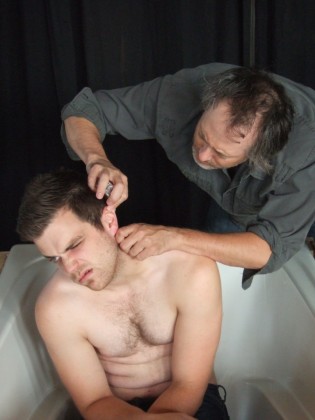New Brad Fraser play too fast for its own good
Posted on September 7, 2013 By Ben Dextraze Entertainment, Front Slider, Theatre

Mathew Hulshof, left, and Dave Horak in Kill Me Now
Kill Me Now is a title that speaks to a desire for death in the face of pain and misery. Add an ironic twist and playwright Brad Fraser’s trademark raucous humour and you might have a hit on your hands. With his new play, running through Sept. 22 at La Cite Francophone, he boldly makes his professional debut in Edmonton as both director and dramatist as he tackles euthanasia – painless mercy killing. But the play moves too fast to hold its weighty subject matter.
When the lights rise on the minimalist set by David Skelton, we are greeted by novelist and creative writing teacher Jake Sturdy (Dave Horak) giving his disabled teenage son Joey a bath. Played believably by Matthew Hulshof, right down to the speech impediment, Joey gets aroused by his father’s touch, which creates an awkward but funny situation that helps form the central theme of family ethics in Fraser’s play. Joey has started developing sexually and has no outlet. He needs help to find happiness.
Jake’s sister Twyla (Melissa Thingelstad) also helps care for Joey and gives a more conservative voice of reason to a family lacking a mother’s touch. Joey’s fetal alcohol syndrome-afflicted friend Rowdy (Patrick Lundeen) enters the story, adding needed laughs and extra tension with his mentally-challenged liberal sexuality. He tells Twyla he’s “well hung and half retarded, what girl wouldn’t like that?” Rowdy only serves to amplify Joey’s teenage desires.
In a sudden ironic twist, the family is thrown into disarray when one of its members suddenly develops an unusual and serious medical condition. The family members come together to help, but as the condition worsens the idea of euthanasia is suddenly broached, forcing friends, family, and lovers to discuss an ethical dilemma: should one accept painless suicide as a humane and viable option for someone they love?
Dave Horack’s Jake is endearing, but he doesn’t find full emotional resonance with his character’s internal struggle. This causes the oddly-staged climactic scene to become overdramatic. Linda Grass plays Jake’s girlfriend Robyn (who has a husband, two kids of her own, and a career) as an emotionally detached professional, while Thinglestad’s Twyla finds room to negotiate her feelings within the rapid fire pacing. She is the shaky pillar on which the faltering family rests.
In the preview performance I attended, the writing and direction felt rushed. The actors attacked Fraser’s fast-paced dialogue as they swiftly picked up cues and hurried along the action, but the emotions carried within some scenes felt forced. In the end, the quick progression of the dramatic comedy steered it away from a believable emotional undercurrent. Either Fraser’s direction didn’t give the actors enough room to ground their emotions from previous scenes, or they just couldn’t keep up to the rapidly progressing plotline. Either way, the balance between writing, style, and performance seemed at odds in a play that moved too quickly. So quick in fact, when the lights rose at the end of the play it felt like an intermission with more that needed to come.













